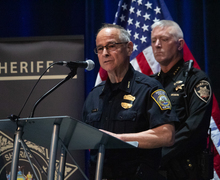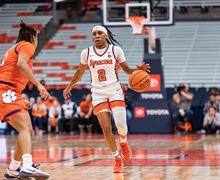Last impression: Allie Curtis reflects on leadership, personal growth
Sam Maller | Asst. Photo Editor
The Student Association has become a part of Allie Curtis’ identity.
“It’s something I’ll carry into the rest of my life,” said Curtis, SA’s president, speaking about the experience she has gained throughout the three years she spent in the organization.
Before being elected as president for the 57th Session, Curtis served as vice president in the 56th Session. As vice president, she established a mentorship program between new and existing assembly members to “inspire people and give them someone to look up to,” Curtis said.
She ran for president on a platform pledging to increase SA’s engagement with students and community involvement.
When Boris Gresely, who was elected as president of the 58th Session, takes office starting this January, the Elect Her initiative — a training program that encourages college women to run for student government — will be held for the first time at SU. The training program was one of Curtis’ most ambitious goals.
“After you’ve been in SA to the extent that I have, you take on that image as someone who is a very active member in the community,” Curtis said. “Being able to make a difference and change things…I will always have that experience.”
Though Curtis’ presidency is ending soon, she said she has decided to remain an active member of SA when she becomes the representative for the S.I. Newhouse School of Public Communications next semester.
“You don’t have to be president to make a difference,” she added.
Curtis said her experience in SA has made her understand the organization’s policies and procedures “inside and out.” Because of that, she wants to remain in the assembly so she can serve as a mentor for other members and ease the transition into Gresely’s administration.
For a brief time in the summer, Curtis said she didn’t want to run for SA president. She said she saw how rough people could be and began to question what might happen if she “put herself out there” as a woman — little did she know that she would face a challenging road ahead as president, which she said included sexism, doubts about her qualifications and an attempted impeachment.
The SA cabinet charged Curtis with violating university regulations by allowing Colin Crowley, former director of public relations, to serve on the cabinet without being enrolled as a student. After a six-hour executive session, the assembly voted against charging her with impeachment.
“I don’t think I could have dealt with everything she’s dealt with — the personal attacks, all the horrible things she had to hear, people trying to diminish everything she’s worked so hard for,” said Duane Ford, SA’s vice president. “She pushed through all that and became stronger.”
Through witnessing the impeachment process, Ford said both he and Curtis learned the importance of trust. He said he saw that the SA president position was “tough, thankless and vicious,” where people are often “out to get you and bring you down.” Still, during his own presidential campaign, Ford said he looked to Curtis’ ability to handle conflict when he experienced personal attacks.
Despite the setbacks Curtis has experienced, Ford said he’s seen her grow as a president and as a person, adding that she “took hold” of the organization. Grading her final term as a B-plus, Ford said he feels both the assembly and the student body have grown to see her more as a person.
“I’m not sure if she changed, or if people just realized,” Ford said.
Being one of Curtis’ best friends, Ford said a lot of people judge Curtis off her looks, pageant career or the impeachment. When she was elected, he said it proved that women are capable of holding presidential office in SA. Ford said the little progress that’s been made is demonstrated by the fact that Curtis still faced stereotypes after reaching the position.
Ford described a situation where Curtis spoke to a student on the Quad about the SA presidential elections after she was named president. He said the student told Curtis he thought it was “stupid” that the candidate who won was a woman — not knowing to whom he was actually speaking.
“Even when she won, people tried to take it away from her, saying it was just because of her looks, which is something that she can’t control,” Ford said. “That was just sad to see, because it really takes that accomplishment away from you.”
PJ Alampi, who ran for SA president against Curtis, said he believes she is one of several female leaders on campus that younger female leaders can look up to. He said Curtis is leaving SA in a position where they can create more change on campus than it could before, as evidenced by an increase in student participation.
He said he credits Curtis for dedicating time and effort to further developing SA as an organization that is fully representative of the student body.
Alampi, who also served as chief of staff on Curtis’ cabinet, eventually resigned from his position after the assembly voted to keep Curtis in office. Alampi said he didn’t decide to leave because of the assembly’s decision, but because he didn’t align with the direction SA was going. He said he feels Curtis handled the impeachment process well by reaching out to SA members individually and asking them how she could improve.
“I think that was one of the best ways to handle it and I commend her for that,” Alampi said. “The members are the ones who make those calls and Allie spoke directly to them. She really came full circle in dealing with the hearing and coming out of it.”
In dealing with the attempted impeachment, Nia Boles, chair of the Student Engagement Committee, said she feels Curtis has set precedence for future leaders in being able to stand their ground. Boles said she would describe Curtis’ presidency in a single word: resiliency.
Boles said she has always had a close relationship with Curtis. Curtis served as Boles’ mentor when she first joined SA. When Boles announced her decision to run for vice president alongside Ford, she said Curtis was the first person she told.
“She taught me everything I know about SA,” Boles said. “I wouldn’t say ‘when she was my mentor’ because Allie will always be a mentor and sister to me, long after SA.”
Reflecting on her time as president, Curtis said it was a “powerful growing experience.” She said she recognized her faults — sometimes being too passive and letting what others say distract her — but realized that her compassion for others will always be a part of who she is.
“I know that I’m always going to be an active voice and stick up for what I think is right,” Curtis said. “I will always be there for other people and that’s what being a president is about.”
Published on November 19, 2013 at 12:47 am
Contact Annie: [email protected]




